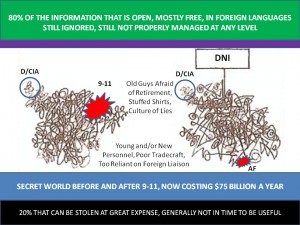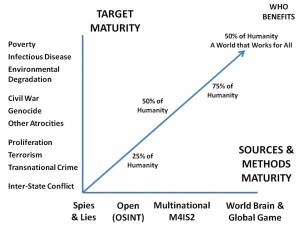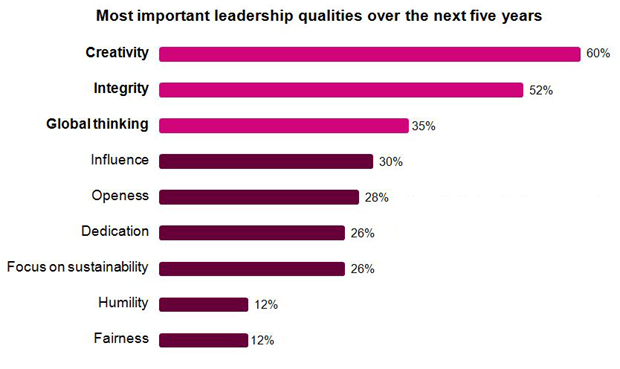Secrecy News: Costs of Major US Wars, Contractors in Iraq & AF, Drones & Homeland Sec
04 Inter-State Conflict, 08 Wild Cards, 09 Terrorism, Budgets & Funding, Commerce, Corporations, Government, Intelligence (government), Military, Money, Banks & Concentrated Wealth, Power Behind-the-Scenes/Special Interests, True CostCOSTS OF MAJOR U.S. WARS COMPARED
More than a trillion dollars has been appropriated since September 11, 2001 for U.S. military operations in Iraq, Afghanistan and elsewhere. This makes the “war on terrorism” the most costly of any military engagement in U.S. history in absolute terms or, if correcting for inflation, the second most expensive U.S. military action after World War II.
A newly updated report from the Congressional Research Service estimated the financial costs of major U.S. wars from the American Revolution ($2.4 billion in FY 2011 dollars) to World War I ($334 billion) to World War II ($4.1 trillion) to the second Iraq war ($784 billion) and the war in Afghanistan ($321 billion). CRS provided its estimates in current year dollars (i.e. the year they were spent) and in constant year dollars (adjusted for inflation), and as a percentage of gross domestic product. Many caveats apply to these figures, which are spelled out in the CRS report.
In constant dollars, World War II is still the most expensive of all U.S. wars, having consumed a massive 35.8% of GDP at its height and having cost $4.1 trillion in FY2011 dollars. See “Costs of Major U.S. Wars,” June 29, 2010.
MILITARY CONTRACTORS IN IRAQ AND AFGHANISTAN
The Department of Defense has more contractors in Iraq and Afghanistan than it has uniformed military personnel, another newly updated report from the Congressional Research Service reminds us.
“The Department of Defense increasingly relies upon contractors to support operations in Iraq and Afghanistan, which has resulted in a DOD workforce that has 19% more contractor personnel (207,600) than uniformed personnel (175,000),” said the CRS report — which forms a timely counterpoint to this week's Washington Post “Top Secret America” series on the tremendous expansion of the intelligence bureaucracy, including the increased and often unchecked reliance on contractors.
The explosive growth in reliance on contractors naturally entails new difficulties in management and oversight. “Some analysts believe that poor contract management has also played a role in abuses and crimes committed by certain contractors against local nationals, which may have undermined U.S. counterinsurgency efforts in Iraq and Afghanistan,” the CRS said. See “Department of Defense Contractors in Iraq and Afghanistan: Background and Analysis,” July 2, 2010.
And see, relatedly, “U.S. Special Operations Forces (SOF): Background and Issues for Congress,” July 16, 2010.
UNMANNED AERIAL SYSTEMS AND HOMELAND SECURITY
The potential benefits and limitations of using unmanned aerial vehicles for homeland security applications were considered by the Congressional Research Service in yet another updated report. See “Homeland Security: Unmanned Aerial Vehicles and Border Surveillance,” July 8, 2010.
The same set of issues was examined in a newly published master's thesis on “Integrating Department of Defense Unmanned Aerial Systems into the National Airspace Structure” by Major Scott W. Walker.
Another new master's thesis looked at the comparatively high accident rate of unmanned systems and their susceptibility to attack or disruption. See “The Vulnerabilities of Unmanned Aircraft System Common Data Links to Electronic Attack” by Major Jaysen A. Yochim.
The “secret history” of unmanned aircraft was recounted in an informative new study published by the Air Force Association. See “Air Force UAVs: The Secret History” by Thomas P. Ehrhard, July 2010.
_______________________________________________
Secrecy News is written by Steven Aftergood and published by the Federation of American Scientists.
Journal: Dana Priest Strikes Again…
Budgets & Funding, Corruption, Cyberscams, malware, spam, Government, InfoOps (IO), Intelligence (government), Methods & Process, Misinformation & Propaganda, Money, Banks & Concentrated Wealth, Politics of Science & Science of Politics, Power Behind-the-Scenes/Special Interests, Reform, Secrecy & Politics of Secrecy, Technologies
July 16, 2010
By Michael Winter
The nation's spy world is anxiously — certainly not eagerly — anticipating a Washington Post series looking at CIA and Pentagon contractors, according to insider reports. And the intelligence community has been preparing for an expected offensive by plotting its defense.
Politico says in “Jitters over WaPo intel series – Explosions rock Iranian mosque – What's Petraeus thinking? – McChrystal's retirement – ‘Monkey Terrorist' update,” that the series, by Dana Priest, is scheduled to appear “in the next few days and that public affairs officers have been preparing how to handle the resulting media onslaught.
The Atlantic has posted a memorandum, “Internal Memo: Intelligence Community Frets About Washington Post Series,” sent by Art House, the media manager for the Director of National Intelligence. He outlines what he thinks the series will say about the “IC” (intelligence community) and offers talking points for press aides.
Here are some of the highlights of the memo:
Themes
While we can't predict specific content, we anticipate the following themes:
*The intelligence enterprise has undergone exponential growth and has become unmanageable with overlapping authorities and a heavily outsourced contractor workforce.
*The IC and the DoD have wasted significant time and resources, especially in the areas of counterterrorism and counterintelligence.
*The intelligence enterprise has taken its eyes off its post-9/11 mission and is spending its energy on competitive and redundant programs.
Management of Responses
We do not know which agencies will receive attention, and each agency will need to manage its own responses. …
It might be helpful as you prepare for publication to draw up a list of accomplishments and examples of success to offer in response to inquiries to balance the coverage and add points that deserve to be mentioned. In media discussions, we will seek to garner support for the Intelligence Community and its members by offering examples of agile, integrated activity that has enhanced performance. We will want to minimize damage caused by unauthorized disclosure of sensitive and classified information. …
House's conclusion: “This series has been a long time in preparation and looks designed to cast the IC and the DoD in an unfavorable light. We need to anticipate and prepare so that the good work of our respective organizations is effectively reflected in communications with employees, secondary coverage in the media and in response to questions.”
Keep your eyes peeled for this blockbuster.
Phi Beta Iota: Panetta had a chance to get it right and blew it. Clapper will finish the job of destroying whatever integrity is left in the US Intelligence Community. This is not news, but the Washington Post has finally caught up with the rest of us.
See Also:
2000 ON INTELLIGENCE: Spies and Secrecy in an Open World (AFCEA, OSS, EIN)
2002 THE NEW CRAFT OF INTELLIGENCE: Personal, Public, & Political (OSS, EIN)
2003 PEACEKEEPING INTELLIGENCE: Emerging Concepts for the Future (OSS, EIN)
2006 INFORMATION OPERATIONS: All Information, All Languages, All the Time (OSS, EIN)
2006 THE SMART NATION ACT: Public Intelligence in the Public Interest (OSS, EIN)
2008 COLLECTIVE INTELLIGENCE: Creating a Prosperous World at Peace (OSS, EIN)
2009 Intelligence for Peace (PKI Book Two) Finalizing (OSS,EIN)
2010 INTELLIGENCE FOR EARTH (OSS, EIN)
And Reviews of Books by Others:
Congress (Failure, Reform) (108)
Empire, Sorrows, Hubris, Blowback (160)
Secrecy News: GAO Oversight of Intelligence, Costs of Secrecy
09 Justice, 10 Security, 11 Society, Budgets & Funding, Corruption, Government, Intelligence (government), Military, Money, Banks & Concentrated Wealth, Power Behind-the-Scenes/Special Interests, ReformGAO OVERSIGHT OF INTEL AGENCIES IN DISPUTE
One of the simplest and most effective ways to strengthen congressional oversight of intelligence agencies would be to task cleared staffers from the Government Accountability Office (GAO), which is the investigative arm of Congress, to undertake specific audits or investigations of intelligence programs. Perhaps the clearest indication of the power of this approach is the fact that the intelligence agencies hate the idea and the White House has threatened a veto if it is adopted by congress.
Senate intelligence committee leaders have already yielded to executive branch opposition on this point, but House Speaker Nancy Pelosi is insisting that the GAO has a role to play in intelligence oversight, and she says she is trying to ensure that Congress does not willingly surrender one of its most sophisticated oversight tools. See “Pelosi Faces Off with Obama on CIA Oversight” by Massimo Calabresi, Time, June 25 and “Acting Spy Chief Plans Departure” by Siobhan Gorman, Wall Street Journal, June 25.
An unreleased opinion from the Justice Department Office of Legal Counsel reportedly holds that intelligence programs are outside the purview of the Government Accountability Office and that intelligence agencies should therefore not cooperate with the GAO.
Although the GAO previously reviewed FBI counterterrorism programs prior to the 2004 intelligence reform legislation, “GAO has been essentially blocked from conducting its current work,” complained Sen. Charles Grassley (R-ID). “The DoJ Office of Legal Counsel is arguing that GAO does not have the authority to evaluate the majority of FBI counterterrorism positions, as these positions are scored through the National Intelligence Program (NIP) Budget.”
The FBI confirmed that the GAO's access to some previously auditable programs has been denied. “With the post-2004 inclusion of FBI counterterrorism positions in the Intelligence Community, aspects of the review GAO proposed in 2009 would have constituted intelligence oversight,” the FBI told Sen. Grassley (at pdf pp. 67-68). “It is the longstanding position of the Intelligence Community to decline to participate in GAO reviews that evaluate intelligence activities, programs, capabilities, and operational functions.”
I recently discussed the question of GAO oversight of intelligence with colleagues from the Project on Government Oversight, which published the conversation as a podcast here.
Phi Beta Iota: Let's not quibble here. CIA and FBI and anyone else that is refusing GAO oversight are committing treason, plain and simple. The US Government is out of control, and if Congress does not start living up to its Article 1 Constitutional responsibilities, there is a very real possibility of a complete over-turning of Congress along with multiple states actively nullifying federal taxation as well as as federal regulation, and some states starting with Vermont seceeding from the Union. The Executive is betraying the public trust and not working in the public interest. It's time We the People pulled the plug with a tax revolt that explicits demands a cessation of funding for both the Pentagon and the secret IC, until such time as they can present to congress a responsible holistic strategy and force structure that produces desired outcomes, not merely a transfer of wealth to Lockheed executives and the banks behind them. ENOUGH!
SECRECY COSTS CONTINUED TO RISE IN 2009
The financial costs of national security classification-related activities continued to rise in 2009, reaching a record high of $9.93 billion for the combined costs of protecting classified information in government and industry, the Information Security Oversight Office reported today (pdf).
Classification-related costs include not simply the act of classification, but also everything that follows from it: physical security for classified materials, computer security for classified information systems, personnel security, and so forth. “The agencies also reported a modest, but welcome increase in spending on declassification programs,” wrote ISOO Director William J. Bosanko in his transmittal letter to the President.
The newly reported cost data do not include classification-related costs for CIA or the large Pentagon intelligence agencies — since those costs are themselves considered to be classified. This means that the costs incurred by the most classification-intensive agencies are outside the scope of the published report, which significantly limits its value. See “Report on Cost Estimates for Security Classification Activities for Fiscal Year 2009,” Information Security Oversight Office, June 25, 2010.
Phi Beta Iota: These costs are severely understated and probably come closer to $15 billion a year than $10 billion. However, taking $10 billion at face value, this means that the costs of secrecy completely apart from the sources and methods in being, are now at least 14% of the total budget for secret intelligence (itself moderately if not substantially understated since DoD concealed a great deal from the DNI in the last 2-3 years). This is flat out NUTS. It is unprofessional, irresponsible, and should at a minimum be grounds for Congressional refusal to fund the secret intelligence community until a 150-250 person GAO Special Intelligence Audit (SIA) unit is formed and given full access.
Journal: Obama To Name Retired General To Top Spy Post
04 Education, 10 Security, Corruption, Government, Methods & Process, Military, Misinformation & Propaganda, Money, Banks & Concentrated Wealth, Policy, Politics of Science & Science of Politics, Secrecy & Politics of Secrecy, Strategy, Technologies, True Cost
Probably not an inspired choice.
MA
New York Times June 5, 2010 Pg. 1
Obama To Name Retired General To Top Spy Post
By Peter Baker and Eric Schmitt
WASHINGTON — President Obama has picked Lt. Gen. James R. Clapper Jr. as director of national intelligence, tapping a retired officer with decades of experience to improve coordination of the nation’s sprawling spy apparatus amid increasing threats at home and escalating operations abroad.
Mr. Obama plans to announce his choice in the Rose Garden on Saturday, two weeks after forcing Adm. Dennis C. Blair out of the spymaster job, according to administration officials, who insisted on anonymity to disclose the decision before the formal ceremony.

See also:
Phi Beta Iota: This alone–a farce on top of a farce–makes him unsuited to the position. Obama and Gates know what they want: to continue Grand Theft Intel as the same time that Grand Theft Pentagon continues the looting of the public treasury. If Congress can rediscover its integrity and invite former Senators such as David Boren (D-OK), Pat Roberts (R-KS), and Bob Graham (D-FL) as well as Senator Sam Nunn (D-GA), they might discover the universal condemnation of “business as usual,” which is precisely what this nominee represents. Whatever claims are made about transformation or revolution will at best be pap and at worst a deliberate breach of trust in lying to the Congress. Dick Cheney would be proud of what passes for leadership in the Department of Defense today.
Reference: Human Intelligence (HUMINT): All Humans, All Minds, All the Time
Earlier Posts on DNI Self-Destruction:
Journal: With No Successor In Sight, Intelligence Czar Departs
AFIO Selected Headline Links with Phi Beta Iota Comments
Revolving Door Between Congress & Wall Street + Oil & Gas Money to Congress
05 Energy, Money, Banks & Concentrated Wealth, Power Behind-the-Scenes/Special Interests
From OpenSecrets.org
Organizations in the financial services sector have deployed at least 1,447 former federal employees to lobby Congress and federal agencies since the beginning of 2009, according to a joint analysis of federal disclosure records and other data released today by Public Citizen and the Center for Responsive Politics. (Download the full report here: FinancialRevolvingDoors.pdf )
| Candidate | Amount |
|---|---|
| Lincoln, Blanche (D-AR) | $286,400 |
| Vitter, David (R-LA) | $242,600 |
| Murkowski, Lisa (R-AK) | $209,826 |
| Boren, Dan (D-OK) | $139,700 |
| Bennett, Robert F (R-UT) | $138,400 |
| Blunt, Roy (R-MO) | $133,100 |
| Cornyn, John (R-TX) | $130,525 |
| Specter, Arlen (D-PA) | $130,400 |
| Edwards, Chet (D-TX) | $123,630 |
| Conaway, Mike (R-TX) | $116,950 |
| Coburn, Tom (R-OK) | $105,100 |
| Barton, Joe (R-TX) | $100,470 |
| Dorgan, Byron L (D-ND) | $92,950 |
| Thune, John (R-SD) | $91,140 |
| Cantor, Eric (R-VA) | $87,000 |
| DeMint, James W (R-SC) | $79,951 |
| Tiahrt, Todd (R-KS) | $79,800 |
| Burr, Richard (R-NC) | $78,200 |
| Ross, Mike (D-AR) | $76,950 |
| Fleming, John Calvin Jr (R-LA) | $76,300 |
Related:
+ Earmark database
Journal: With No Successor In Sight, Intelligence Czar Departs
Analysis, Augmented Reality, Budgets & Funding, Collective Intelligence, Computer/online security, Counter-Oppression/Counter-Dictatorship Practices, Geospatial, Government, InfoOps (IO), Intelligence (government), Key Players, Maps, Methods & Process, microfinancing, Money, Banks & Concentrated Wealth, Open Government, Policies, Policy, Politics of Science & Science of Politics, Power Behind-the-Scenes/Special Interests, Reform, Research resources, Secrecy & Politics of Secrecy, Strategy, Technologies, Threats, Tools, True Cost FULL STORY: Declassified (newsweek.com/blogs)
FULL STORY: Declassified (newsweek.com/blogs)
May 28, 2010
By Mark Hosenball
On Dennis Blair’s last day in office as director of national intelligence, the Obama administration seems more stymied than ever in its efforts to replace him.
Following a torrent of criticism from Capitol Hill—apparently touched off by this Declassified interview with Rep. Pete Hoekstra, the House Intelligence Committee’s top Republican—the candidacy of James Clapper looks doubtful to say the least. On top of Hoekstra’s criticism of the retired three-star general, who currently serves as the Defense Department’s intelligence chief, the Senate Intelligence Committee’s leaders are now also publicly saying they think he’s the wrong man for the job.
. . . . . .
The latest boomlet in speculation on potential candidates is centered on Michael Vickers, a former Green Beret and CIA operative who has been the Defense Department’s top civilian in charge of counterterrorism and special-operations programs slnce late in the Bush administration. Vickers was one of 15 potential DNI candidates we identified when news of the job opening broke….
. . . . . . .
But other names keep coming up. Some, such as Homeland Security undersecretary Rand Beers, Joint Chiefs of Staff Deputy Chairman Gen. James Cartwright, and outgoing Sen. Evan Bayh, have surfaced before (one former official who worked in national security positions with Beers describes him as “indefatigable”). But others are new to this particular search, including Rep. Jane Harman, former Ambassador to Iraq Ryan Crocker, and former CIA deputy director John McLaughlin.
 Phi Beta Iota: Worth a complete read. Here are the fifteen potential DNI's they identified earlier:, followed by our picks.
Phi Beta Iota: Worth a complete read. Here are the fifteen potential DNI's they identified earlier:, followed by our picks.
Political and bureaucratic heavyweights:
FBI Director Robert Mueller
CIA Director Leon Panetta
Deputy Secretary of State James Steinberg
Marine Gen. James Cartwright, deputy chair of the Joint Chiefs of Staff
Intelligence and defense technocrats:
Lt. Gen. Jim Clapper, currently Defense Department intelligence supremo;
Michael Vickers, assistant defense secretary for special operations;
John Hamre, a former deputy defense secretary;
Harvard academic Joseph Nye, also a former senior Pentagon official; and
John McHugh, a former GOP congressman whom Obama named as secretary of the Army.
High-profile intelligence politicos:
John Brennan, the White House counterterrorism and Homeland Security supremo; or
Rand Beers, a former career intelligence official who left his job as a senior counterterrorism adviser in the George W. Bush White House to become national security adviser to Democratic presidential candidate John Kerry, and now serves as undersecretary of Homeland Security
High-profile politicos:
former Sen. Chuck Hagel, a Republican close to Obama; former congressman and
intelligence-reform campaigner Lee Hamilton;
former Indiana senator Evan Bayh; and
former representative Tim Roemer (another intel-reform campaigner who is now U.S. ambassador in India)
 Phi Beta Iota: Everyone in the above lists is a ridiculous untenable suggestion with one exception: Senator Chuck Hagel. His combination of integrity, substantive experience, standing on the Hill, and general non-partisan common sense, is ideal. What he lacks is a kick-ass deputy who actually understands all the crap that the agencies–and their den mother Jim Clapper–put forward. Leon Panetta would actually be very good as the Deputy, responsible for turning off all funds to all agencies at 20% a year (10% a year restored for new initiatives; savings to education and national research under DNI oversight as provided for in the Smart Nation-Safe Nation Act) but Hagel is going to need a kitchen cabinet of truth-tellers and we are pretty sure he is not even aware of who they might be. That is his sucking chest wound–if he solves that he will not only earn Obama a second term, he will transcend politics and impact directly on the totality of all budgets–US, state & local, other nations, corporations, NGOs. Jack Devine is in the wings in New York, the Trilateral Commission's choice for either DNI or Director of Central Intelligence, he has our vote for the latter position.
Phi Beta Iota: Everyone in the above lists is a ridiculous untenable suggestion with one exception: Senator Chuck Hagel. His combination of integrity, substantive experience, standing on the Hill, and general non-partisan common sense, is ideal. What he lacks is a kick-ass deputy who actually understands all the crap that the agencies–and their den mother Jim Clapper–put forward. Leon Panetta would actually be very good as the Deputy, responsible for turning off all funds to all agencies at 20% a year (10% a year restored for new initiatives; savings to education and national research under DNI oversight as provided for in the Smart Nation-Safe Nation Act) but Hagel is going to need a kitchen cabinet of truth-tellers and we are pretty sure he is not even aware of who they might be. That is his sucking chest wound–if he solves that he will not only earn Obama a second term, he will transcend politics and impact directly on the totality of all budgets–US, state & local, other nations, corporations, NGOs. Jack Devine is in the wings in New York, the Trilateral Commission's choice for either DNI or Director of Central Intelligence, he has our vote for the latter position.
The problem President Obama has is in the White House is that no one working for him actually “gets it” with respect to 21st Century governance–between his pogomist and his pollster and his talented but oblivious others, he is running on fumes, will not get a second term, and is simply counting the days to when he can follow Bill Bradley, Al Gore, and Bill Clinton in Goldman Sachs honey-land–and screw the American public, they were never the intended beneficiaries of all this in the first place.
References for any future DNI:
Human Intelligence (HUMINT): All Humans, All Minds, All the Time (SSI, 2010)
The Smart Nation Act: Public Intelligence in the Public Interest (OSS, 2006)
Information Operations: All Information, All Languages, All the Time (OSS, 2006)
The New Craft of Intelligence: Personal, Public, & Political (OSS, 2002)
On Intelligence: Spies and Secrecy in an Open World (AFCEA, 2000; OSS, 2001)
and for the really big picture:
Intelligence for Earth: Clarity, Diversity, Integrity, & Sustainability (EIN, 2010)
Collective Intelligence: Crating a Prosperous World at Peace (EIN, 2008)
Peacekeeping Intelligence: Emerging Concepts for the Future (OSS, 2003)




